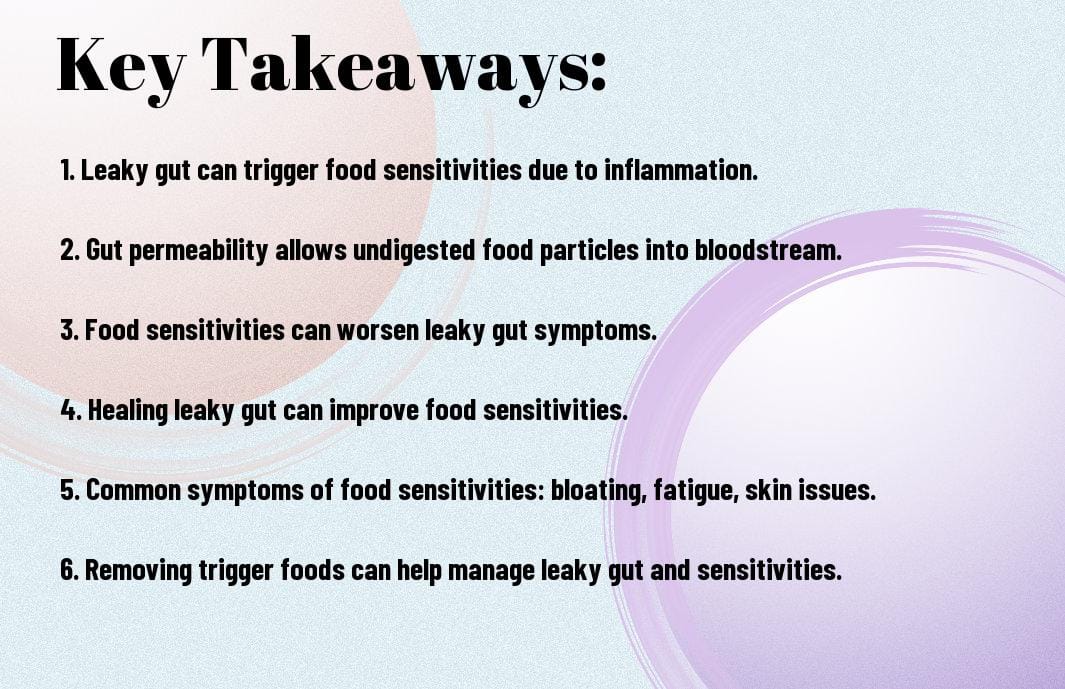Over the past few decades, research has increasingly shown a strong link between leaky gut syndrome and food sensitivities. Leaky gut, a condition where the intestinal barrier becomes permeable, can lead to undigested food particles and toxins crossing into the bloodstream, triggering immune responses and food sensitivities. Understanding the difference between food allergies and sensitivities is crucial in managing symptoms and improving overall gut health. To learn more about this distinction, check out our blog post on What’s The Difference Between A Food Allergy and a Food Sensitivity.

One of the key players in maintaining a healthy gut is the gut microbiome. This vast community of trillions of microorganisms living in our intestines plays a crucial role in digestion, nutrient absorption, and immune function. The balance of good and bad bacteria in the gut microbiome is necessary for optimal gut health, as an imbalance can lead to various digestive issues, including leaky gut syndrome.
For individuals with leaky gut syndrome, the integrity of the intestinal barrier is compromised, allowing toxins, undigested food particles, and harmful bacteria to leak into the bloodstream. Several factors can contribute to increased intestinal permeability, including:
Intestinal permeability can also be exacerbated by certain medications, such as nonsteroidal anti-inflammatory drugs (NSAIDs) and antibiotics. Perceiving and addressing these contributing factors is crucial in the management and treatment of leaky gut syndrome.
For individuals struggling with leaky gut syndrome, it is necessary to understand the role of the gut microbiome in maintaining digestive health. The gut microbiome is a complex ecosystem of bacteria, fungi, and other microorganisms that play a vital role in digestion and immune function. Imbalances in the gut microbiome can contribute to increased intestinal permeability, leading to a cascade of negative health effects.
While food sensitivities can vary from person to person, there are some common culprits that are known to trigger reactions in many individuals. These include dairy products, gluten, eggs, soy, and nuts. Keeping a food diary and eliminating these potential triggers from your diet can help identify which foods may be causing your symptoms.
Identifying the specific triggers of food sensitivities is crucial in managing symptoms and improving overall health. When the immune system mistakenly identifies a harmless food protein as a threat, it launches an attack by producing antibodies against it. This immune response can lead to inflammation in the digestive tract, resulting in symptoms such as bloating, constipation, diarrhea, and fatigue.
This improper immune reaction can also lead to damage in the gut lining, known as leaky gut syndrome. In this condition, the intestinal barrier becomes compromised, allowing undigested food particles and toxins to enter the bloodstream and trigger further immune responses throughout the body.
Now, let’s research into the connection between leaky gut syndrome and food sensitivities. Leaky gut, also known as increased intestinal permeability, occurs when the lining of the gut is damaged, allowing undigested food particles, toxins, and bacteria to leak into the bloodstream. This can trigger an immune response and lead to the development of food sensitivities.
Now, let’s explore the impact of diet on gut health and inflammation. The foods we eat play a crucial role in maintaining the health of our gut lining. A diet high in processed foods, refined sugars, and saturated fats can contribute to inflammation and damage to the intestinal barrier, increasing the risk of leaky gut syndrome and food sensitivities.
Impact: It is vital to focus on a nutrient-rich diet that includes plenty of fiber, antioxidants, and healthy fats to support gut health and reduce inflammation. Incorporating probiotic-rich foods like yogurt, kefir, and fermented vegetables can also help maintain a healthy balance of gut bacteria and support a strong intestinal barrier, reducing the likelihood of developing food sensitivities.
For those dealing with leaky gut syndrome, focusing on dietary strategies can play a crucial role in promoting healing. Sensitivities to certain foods can exacerbate gut inflammation and permeability. It is important to identify and eliminate trigger foods such as gluten, dairy, processed sugars, and artificial additives. Incorporating gut-healing foods like bone broth, fermented foods, and soothing herbal teas can aid in repairing the gut lining and restoring balance to the microbiome.
For individuals looking to prevent leaky gut syndrome and food sensitivities, making lifestyle changes is key. Maintaining a healthy gut microbiome through probiotic-rich foods, managing stress levels, getting adequate sleep, and staying hydrated are all important factors in supporting gut health. Avoiding toxins and chemicals found in processed foods, pesticides, and environmental pollutants can also help prevent inflammation and damage to the gut lining.
Leaky gut syndrome and food sensitivities can have a significant impact on overall health and well-being. By implementing dietary strategies, preventative measures, and lifestyle changes, individuals can support their gut health and reduce the risk of developing these conditions.
The connection between leaky gut syndrome and food sensitivities is well-established in scientific research. Leaky gut can lead to the development of food sensitivities due to the compromised intestinal barrier, allowing undigested food particles to enter the bloodstream and trigger immune responses. Identifying and addressing leaky gut can play a crucial role in managing food sensitivities and improving overall health. It is important to work with healthcare professionals to develop a personalized treatment plan that targets both leaky gut and food sensitivities to achieve optimal health outcomes.
This post contains affiliate links. I will earn a commission if you buy through my link.
Over the past few decades, research has increasingly shown a strong link between leaky gut syndrome and food sensitivities. Leaky gut, a condition where the intestinal barrier becomes permeable, can lead to undigested food particles and toxins crossing into the bloodstream, triggering immune responses and food sensitivities. Understanding the difference between food allergies and sensitivities is crucial in managing symptoms and improving overall gut health. To learn more about this distinction, check out our blog post on What’s The Difference Between A Food Allergy and a Food Sensitivity.

One of the key players in maintaining a healthy gut is the gut microbiome. This vast community of trillions of microorganisms living in our intestines plays a crucial role in digestion, nutrient absorption, and immune function. The balance of good and bad bacteria in the gut microbiome is necessary for optimal gut health, as an imbalance can lead to various digestive issues, including leaky gut syndrome.
For individuals with leaky gut syndrome, the integrity of the intestinal barrier is compromised, allowing toxins, undigested food particles, and harmful bacteria to leak into the bloodstream. Several factors can contribute to increased intestinal permeability, including:
Intestinal permeability can also be exacerbated by certain medications, such as nonsteroidal anti-inflammatory drugs (NSAIDs) and antibiotics. Perceiving and addressing these contributing factors is crucial in the management and treatment of leaky gut syndrome.
For individuals struggling with leaky gut syndrome, it is necessary to understand the role of the gut microbiome in maintaining digestive health. The gut microbiome is a complex ecosystem of bacteria, fungi, and other microorganisms that play a vital role in digestion and immune function. Imbalances in the gut microbiome can contribute to increased intestinal permeability, leading to a cascade of negative health effects.
While food sensitivities can vary from person to person, there are some common culprits that are known to trigger reactions in many individuals. These include dairy products, gluten, eggs, soy, and nuts. Keeping a food diary and eliminating these potential triggers from your diet can help identify which foods may be causing your symptoms.
Identifying the specific triggers of food sensitivities is crucial in managing symptoms and improving overall health. When the immune system mistakenly identifies a harmless food protein as a threat, it launches an attack by producing antibodies against it. This immune response can lead to inflammation in the digestive tract, resulting in symptoms such as bloating, constipation, diarrhea, and fatigue.
This improper immune reaction can also lead to damage in the gut lining, known as leaky gut syndrome. In this condition, the intestinal barrier becomes compromised, allowing undigested food particles and toxins to enter the bloodstream and trigger further immune responses throughout the body.
Now, let’s research into the connection between leaky gut syndrome and food sensitivities. Leaky gut, also known as increased intestinal permeability, occurs when the lining of the gut is damaged, allowing undigested food particles, toxins, and bacteria to leak into the bloodstream. This can trigger an immune response and lead to the development of food sensitivities.
Now, let’s explore the impact of diet on gut health and inflammation. The foods we eat play a crucial role in maintaining the health of our gut lining. A diet high in processed foods, refined sugars, and saturated fats can contribute to inflammation and damage to the intestinal barrier, increasing the risk of leaky gut syndrome and food sensitivities.
Impact: It is vital to focus on a nutrient-rich diet that includes plenty of fiber, antioxidants, and healthy fats to support gut health and reduce inflammation. Incorporating probiotic-rich foods like yogurt, kefir, and fermented vegetables can also help maintain a healthy balance of gut bacteria and support a strong intestinal barrier, reducing the likelihood of developing food sensitivities.
For those dealing with leaky gut syndrome, focusing on dietary strategies can play a crucial role in promoting healing. Sensitivities to certain foods can exacerbate gut inflammation and permeability. It is important to identify and eliminate trigger foods such as gluten, dairy, processed sugars, and artificial additives. Incorporating gut-healing foods like bone broth, fermented foods, and soothing herbal teas can aid in repairing the gut lining and restoring balance to the microbiome.
For individuals looking to prevent leaky gut syndrome and food sensitivities, making lifestyle changes is key. Maintaining a healthy gut microbiome through probiotic-rich foods, managing stress levels, getting adequate sleep, and staying hydrated are all important factors in supporting gut health. Avoiding toxins and chemicals found in processed foods, pesticides, and environmental pollutants can also help prevent inflammation and damage to the gut lining.
Leaky gut syndrome and food sensitivities can have a significant impact on overall health and well-being. By implementing dietary strategies, preventative measures, and lifestyle changes, individuals can support their gut health and reduce the risk of developing these conditions.
The connection between leaky gut syndrome and food sensitivities is well-established in scientific research. Leaky gut can lead to the development of food sensitivities due to the compromised intestinal barrier, allowing undigested food particles to enter the bloodstream and trigger immune responses. Identifying and addressing leaky gut can play a crucial role in managing food sensitivities and improving overall health. It is important to work with healthcare professionals to develop a personalized treatment plan that targets both leaky gut and food sensitivities to achieve optimal health outcomes.
This post contains affiliate links. I will earn a commission if you buy through my link.
